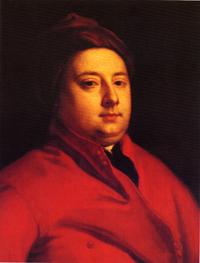1688 - 1752
Protagonist of suprapubic stone removal
 William Cheselden (1688 - 1752) was born in Somerby, Leicestershire. In 1710 he was admitted to the Company of Barber-Surgeons and elected as a Fellow of the Royal Society in 1712.
William Cheselden (1688 - 1752) was born in Somerby, Leicestershire. In 1710 he was admitted to the Company of Barber-Surgeons and elected as a Fellow of the Royal Society in 1712.
In 1718 he was appointed an assistant surgeon to St Thomas' Hospital and full surgeon in 1720 where he specialised in the removal of bladder stones
In 1744 he was elected Warden of the Company of Barber-Surgeons and had a role in the separation of the surgeons from the barbers and in the creation of the Company of Surgeons in 1745, later to become the Royal College of Surgeons of England.
Cheselden learned the suprapubic approach to removing bladder stones and published "A Treatise on the High Operation for the Stone" in 1723. He later became disillusioned by this method and improved on the lateral lithotomy technique which he first performed in 1727. The procedure was short (minutes instead of hours) and, in his hands, had a low mortality rate (approximately 50%).
He died at Bath in 1752.
Books & papers about William Cheselden
William Cheselden
A biography by Sir Zachary Cope
Pub: E&S Livingstone Ltd, Edinburgh & London, 1953 |
More information on Amazon |
William Cheselden, the Father of Lithotomy
Wheatstone S, Challacombe B, Dasgupta P
de Historia Urologiae Europeae 2004; 11: 81-90 |
No link currently available |
← Back to Books & Articles on People in Urology